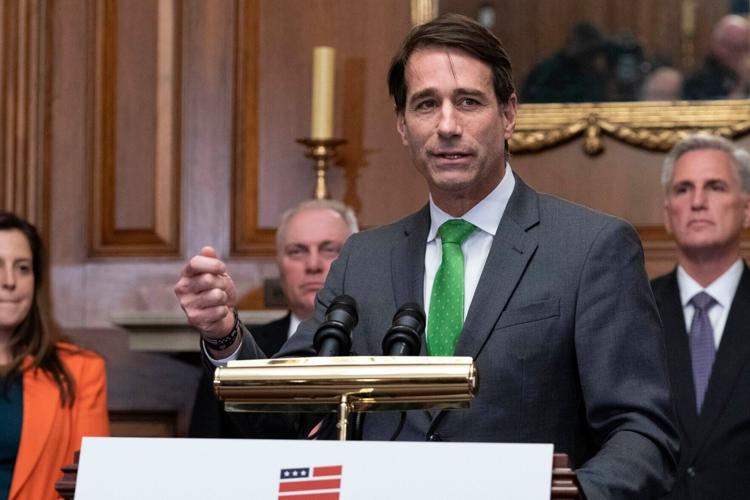WASHINGTON — U.S. Rep. Garret Graves jokes that so many people have opinions about his future that maybe he should just return to the TCBY soft-serve counter where he worked in high school.
Graves, a Baton Rouge Republican, knows some people have been ready to pen his political obituary ever since new congressional maps turning his mostly White Republican district into one with a Black Democratic majority made him an instant long shot.
One thing is for certain, though – he’s not running for mayor of Baton Rouge, despite numerous reports claiming he will. “I am not running for mayor, period,” Graves said Wednesday.
He’s also not going to lay back for two years and challenge U.S. Sen. Bill Cassidy, who lives nearby and with whom he shares many supporters.
No, Graves said: He's staying in Congress. He insists a three-judge federal panel hearing the case in Shreveport in a few weeks is going to reject the new map drawn by the Legislature that turned his Capitol Region district into one that now looks like a shoulder belt stretching across parts of Baton Rouge, Acadiana, Alexandria and Shreveport.
“There is no chance this map will stand. So, I’m not going through hypotheticals,” Graves said. “There’s going to be a capital-centric district, and that’s where I will be running."
Right now, under the newly enacted legislative maps, four districts cover the capital region. There's no requirement that Graves or anyone else live in the district they are seeking to represent. So what happens if the status quo remains – that is, if the federal court doesn’t change the maps, and Graves finds himself running in a majority Black district against former Congressman and current state Sen. Cleo Fields — who runs a powerful political organization in Baton Rouge and is already raising money?
While Graves refuses to discuss "hypotheticals" – even those based on the current state of play – it's a favorite parlor game for Louisiana political operatives. Ten of them handicapped Graves' options, speaking on the condition of anonymity in order to speak freely.
“Garret is really in a bind,” said one, voicing a commonly held sentiment.
Staying put
If the new maps remain, Graves of course may seek re-election to his reconfigured, Black-majority district, but that's widely viewed as an uphill battle given the demographics.
But it may not be impossible. For one thing, Graves has plenty of money: $3.8 million in his campaign war chest, compared to $5.4 million for House Majority Leader Steve Scalise, R-Jefferson, and $1.3 million for Rep. Julia Letlow, R-Start, according to the latest Federal Elections Commission filings. Just last week, Graves held a successful fundraiser in Baton Rouge that should even add more money to his campaign.
A fat warchest could make Graves competitive even in a Black majority district, particularly if other major Black political figures besides Fields were to join the race. Gary Chambers, a Baton Rouge community activist who previously ran for the 2nd Congressional District, is also weighing a bid.
Though Fields is much loved in the predominantly Black and Democratic neighborhoods of north Baton Rouge, he is reviled by many Whites in the Republican neighborhoods of south Baton Rouge. But many of those precincts have now been transferred to Letlow’s 5th Congressional District.
It’s not unprecedented for White politicians to win elections where Black voters are in the majority. Mitch Landrieu did it in New Orleans. Martin O’Malley did it in Baltimore. But both are prominent Democrats, and both were running for mayor, where partisan politics are less central.
But Graves is a conservative Republican – albeit one of the few House Republicans willing to work with Democrats to get things done, and one of the few voices on the right that criticizes the over-the-top rhetoric favored by some right-wingers.
Even so, Graves “has a chance [in the 6th District], given the money, given the low turnout rates among African American voters,” said G. Pearson Cross, a political science professor at the University of Louisiana-Monroe. Though backing former President Donald Trump with 90% of his votes, Graves has some traits that would appeal to Democratic voters.
“He’s not willing to kiss the ring and he’s willing to work across the aisle, which are two cardinal sins in (Republican) politics right now,” Cross said.
Looking elsewhere
The oddsmakers mostly assume that if the new maps are allowed, Graves would most likely run in one of the four districts where White voters are in the majority. He'd be least likely to take on House Speaker Mike Johnson, of Benton, both because of Johnson's stature and because most of his district is geographically distant from Graves' base. For similar reasons, he'd be unlikely to take on House Majority Leader Steve Scalise, of Jefferson, though Scalise's new district includes parts of Graves' old one.
That leaves the districts now represented by Letlow or Rep. Clay Higgins, of Lafayette.
Cross and others in the political community say challenging Higgins wouldn’t be productive. Higgins won reelection in 2022 overwhelmingly and retained the bulk of his district in the remap.
Most strategists agree Graves would have the best chance challenging Letlow, the only woman in the delegation.
In the January redistricting map, Letlow’s 5th Congressional District picked up about 44% of the Capital Region precincts currently represented by Graves, which he won overwhelmingly in multiple elections.
“Regionally, that just makes sense,” said Roy Fletcher, a veteran political strategist from Baton Rouge. “It’s not very good regionally for her. He could rally the people in south Baton Rouge. She would need 43-45% in south Baton Rouge.”
Under the new maps, Letlow represents the LSU campus, which is within walking distance of Graves’ home and but 175 miles, through Mississippi, from her northeast Louisiana home.
“If I had to, I would recommend he take the easiest race he can, and that’s a run against Letlow,” Fletcher said, echoing the opinions of other strategists.
One problem, though, is that Letlow is the widow of a close friend of Graves. Graves was a pallbearer at Luke Letlow’s funeral.
And while Graves has roughly twice the campaign cash as Letlow, she has Trump’s endorsement. Graves was very late to endorse Trump, which could anger the former president.
Graves dismissed talk about such a match, saying he firmly believes the federal courts will order the Legislature’s new map to be redrawn.
“There’s not a chance I’ll be going down that path and talking about those hypotheticals because there’s no probability those maps are going to survive a court assessment,” Graves said.
A fall from grace
A year ago, Graves was flying high. He represented the Republican House majority in budgetary negotiations with the White House and jostled his way into a position that could make him the next chair of the powerful House Transportation and Infrastructure Committee, a panel that oversees roads and bridges, flood control, pipelines, ports and airports along with other interests important to south Louisiana.
But his political fortunes quickly nose-dived, thanks to a combination of factors.
Graves last year was being mentioned as a possible candidate for governor. But after a fractious lunch meeting in Livonia with Attorney General Jeff Landry, now the governor, Graves opted to endorse an old friend from the Jindal years, Stephen Waguespack, a business lobbyist, over Landry. Waguespack finished a distant third.
Meanwhile, in Washington, a group of right-wingers orchestrated the ouster of Speaker Kevin McCarthy, the California Republican who was Graves' mentor. An angry Graves made several public statements that were widely viewed, he says mistakenly, as hurting Majority Leader Scalise’s bid for the top job. Hard feelings from that episode persist among the Louisiana delegation.
Two months ago, Landry called a special session shortly after taking office to redraw Louisiana's six congressional districts. The move sought to satisfy federal courts, which have been saying that, given the share of African Americans living in Louisiana, the districts needed give Black candidates a fighting chance of getting elected in two of the state’s six congressional districts, rather than just one. Black people make up about nearly a third of Louisiana's residents.
Regardless of what the court said, Graves firmly believes the Legislature made a hash of the job and it won't stand up.
“What they did, breaking up into the crazy lines that they did, is an absolute slap in the face to the Capital Region," he said. "It violates all three mapping principles. It was one of the stupidest things the Legislature has done."


